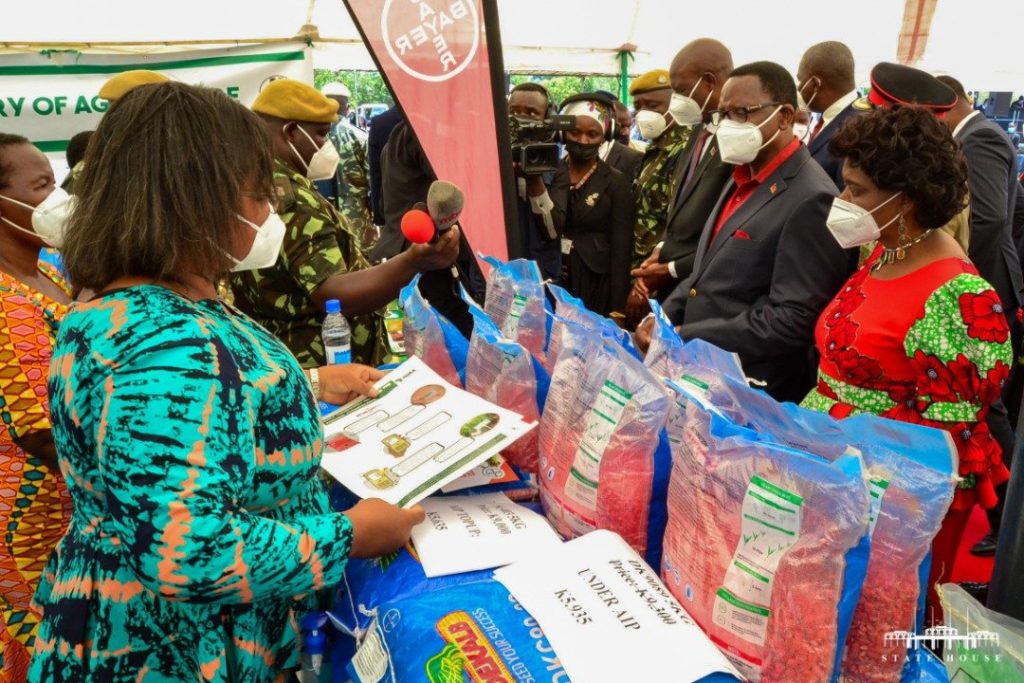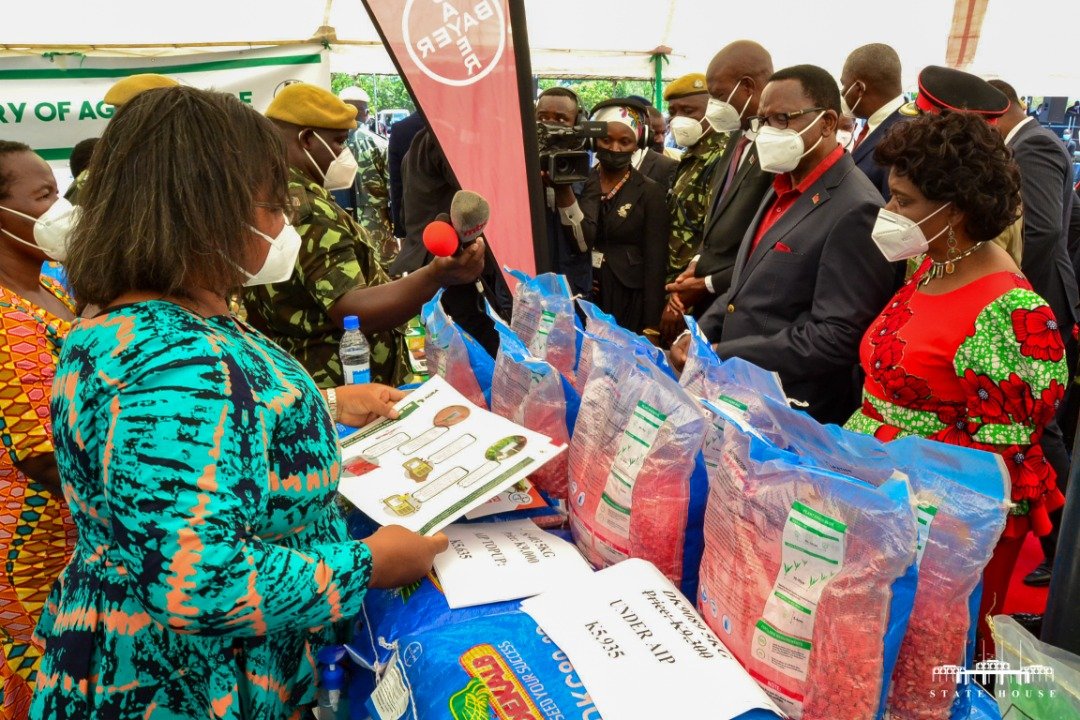Written by Chikumbutso Mtumodzi
On Saturday, October 16, 2021 President of the Republic Dr. Lazarus McCarthy Chakwera officially launched the 2021/2022 Affordable Input Programme (AIP) in Chiradzulu, saying there is need to change, including the mind-set, because change is what Malawi needs and change is part of the ‘New Malawi’ he and his Malawi Congress Party (MCP) administration are building.
“There are some in this country who claim that making changes in the implementation of the AIP means that we are no longer fulfilling our promise. But this kind of thinking that resists change is retrogressive. Every programme that is designed to serve Malawians goes through changes. Change is not just inevitable, but healthy and necessary. Change is evidence that something is alive and growing.
“In the case of the AIP, we have to always identify the changes that need to be made in order to make the programme better and more sustainable. For example, every year of this programme, we have to assess if the price of inputs needs to change in response to economic factors while maintaining the goal of making inputs affordable. And depending on emerging issues such as the state of investments, irrigation, agriculture commercialization, livestock development, and agro processing, more changes will have to be made.
“Additionally, one of the exit strategies for the AIP is ensuring that farmers’ incomes increase so that they can be weaned off the programme.
“The idea is that those who can afford commercial market prices after benefiting from the programme should do so, thus ending their dependence on subsidized inputs,” said the President.

AIP SUCCESS
President Chakwera observed that last year, the AIP was a success and that millions of farmers across testified that a new Malawi of bumper harvest is here. President Chakwera said millions of parents who were able to feed their children said that a new Malawi of zero hunger is here. Traders who have been able to export maize and bring in much needed forex agreed that a new Malawi of agribusiness is here, he said.
“What we are doing here is reaffirming our commitment to that new Malawi. What we are doing here is keeping our promise to those farmers, parents, and traders, that we would make sure the AIP succeeds again.
“What we are doing here is defying those who prophesy doom against the AIP without providing an alternative programme that equally guarantees food security for every Malawian. What we are doing here is announcing to the world that the food security we promised is here to stay,” said the Malawi leader.
In the first edition of the AIP, Malawi registered a 21 percent increase in maize production from 3.8million tons to 4.6 million tons. This is the highest recorded maize production figure the country has ever attained. This reduced the proportion of households that were not able to meet their annual food requirement by 43 percent.
Beyond fulfilling the promise of food security, AIP has also been instrumental in ensuring that President Chakwera and his administration make progress in fulfilling two promises, namely job creation and wealth creation.
This is because for the first time in Malawi’s history, government made sure the input supply and retailing for the AIP are largely private sector led. Over the past year, 72 private companies were awarded fertilizer contracts, compared to only 2 public institutions. In the process, over 3000 retail outlets were opened, offering employment and wealth generation opportunities to hundreds of thousands Malawians across the AIP supply chain.
President Chakwera said this year, he expects the Ministry of Agriculture to work with all stakeholders in ensuring that the programme is even better, drawing on lessons from the past year and that the glitches that were experienced last year have been anticipated and addressed in advance.
Examples include poor internet connectivity, poor management of beneficiaries resulting in them waiting in line for long hours or days, poor penetration of hard to reach areas, poor stocking of inputs, and poor accessibility of financing for some companies. We have to anticipate challenges and provide solutions to them in advance. Panic leadership has no place in the new Malawi we are building.

PROJECTS ANCHORING AIP
President Chakwera said his administration will ensure that projects that maximize the AIP are making progress. These include the Malawi Fertilizer Company’s Inland Terminal, which he officially inaugurated in Liwonde, Machinga and the Linga Dam in Nkhata Bay, which the President will also officially inaugurate soon, which has a capacity of 15 million cubic meters of water to be conserved for irrigation and other purposes. The Shire Valley Transformation Programme is another massive irrigation project that is underway. According to President Chakwera, such developments will ensure that the AIP is put to optimal use and will change the landscape of the agriculture sector.
“So as far as I am concerned, changes in the AIP over time are a good thing, as long as they are introduced responsibly and consultatively, not haphazardly and unilaterally.
“The most important change that is needed in the AIP is a change in our attitude and behaviour towards farming across the board. We need to change our farming priorities, diversifying our crops and recognizing that not all crops and soils require fertilizer. We need to change our institutional attitudes, ensuring that there is coordination between the Ministry of Agriculture and other Ministries like Trade and Industries that are critical for adding value to crops and identifying markets for them ahead of time.
“We need to change the relationship between Government and private sector players in the agriculture sector, because the cat and mouse approach we currently have is primitive and needs to be replaced by a real partnership that seeks to deliver value for money to Malawians,” said the Head of State.
AIP GOAL AND OBJECTIVES
Affordable Inputs Programme, goal is “to attain food security at household and nation levels thereby contributing to poverty reduction.” The 2021/22 AIP season specific objectives are to improve access to quality farm inputs; to increase cereal (maize, rice, sorghum) production at household level; to increase livestock production; and to Improve national and household incomes through sale surplus produce.
AIP CONTRACTS
To-date, the Ministry of Agriculture offered contracts for retail warehouse and distribution of fertilizer to 164 companies.
The country has over 87% percent of the total fertilisers that the 2021/2022 AIP farming season requires, and the balance is in transit to Malawi.
FARM INPUTS REDEMPTION
In this farming season the Ministry of Agriculture has improved the electronic system for redemption where beneficiaries use National Identity cards whenever they are ready to buy the inputs. To avoid network problems, more frequent in the last season’s programme, the Ministry has added GSM (this is a platform which allows the system to send transactions without internet, this works as SMS on our phones). Beneficiaries whose ID cards expired that they will be allowed to access inputs.
The measures which have been put in place to address the 2020/2021 AIP season problems will help farmers not to stand for a long time on queues, sleeping for days while redeeming the inputs. This will ensure that farmers are not spending more money while redeeming their inputs.
In this farming season, seed packages will have scratch card labels. This will help farmers to receive messages on their phones upon scratching the labels on each seed pack purchased. This will help farmers to purchase certified seeds. This arrangement will protect farmers from buying counterfeit seeds.
The Chakwera administration will ensure that farmers buy quality farm inputs for both fertilisers and seeds through comprehensive mechanisms that it has put in place and that Ministry of Agriculture officials shall do quality assurance checks for both fertilisers and seeds through inspections in warehouses and retail shops.
Ministry of Agriculture, other Government Ministries, District Councils, and agencies have also put in place various mechanisms to prevent corruption, fraud in this year’s programme for its successful implementation.
THIS YEAR’S PACKAGE
Under this year’s AIP package; a beneficiary will be entitled to one 50kg bag of Urea and one 50kg bag of NPK fertiliser each at MWK7,500.00 and government will pay MWK3,365.00 per one 5kg seed purchased. In order to bring in diversity and effectiveness in this programme, the Ministry of Agriculture has included a provision of livestock to farmers in Nsanje and Chikwawa districts. Each farmer will get two female goats, each at MWK7,500.00.
NUMBER OF BENEFICIARES
In total, this programme is expected to benefit three million seven hundred forty-four thousand one hundred and five (3,744,105) smallholder farming households across all districts in the country. The total number of beneficiaries for this farming season remains the same to the one that was used in the last farming season. From this figure, three million seven hundred and fourteen thousand one hundred and five farmers (3,714,105) will benefit in crop production package while thirty thousand farmers (30,000) will benefit from the livestock package.



